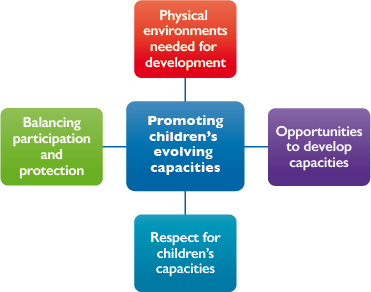2.7 Promoting children’s evolving capacities
We have learned that it is possible to identify broad patterns of development that take place across given age spans. However, children’s evolving capacities are significantly affected by their particular experiences. As you saw in Study Session 1, the process of gradual development and emergence from dependency is known as the child’s evolving capacities. There is growing recognition that children’s development is not a pre-determined process that takes place automatically. Rather it is a cultural process, which is affected by the social, economic and cultural factors in the life of the child, as well as the opportunities available to them.
What do we mean by social, cultural and economic factors?
Social factors – these are things like how the family, the local community, and daily life is organised. For example, who looks after children? Is there a large extended family support system? Who does what tasks?
Cultural factors – these are the attitudes and values in a family and community – the way they bring up children, the type of discipline used, how children are expected to behave, attitudes towards education and play.
Economic factors – these relate to how poor or well-off a family is, what kind of housing they have, the sort of work they do, the level of education the parents have.
It is necessary to build an understanding of what factors are known to have a positive or negative influence on children’s lives, and which contribute to their development or evolving capacities (see Figure 2.1).

2.6 Understanding stages of development
